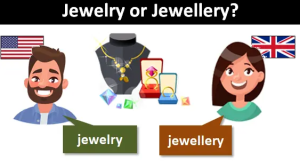
If you’ve ever shopped online, read an article, or even walked past a luxury store window, you’ve likely noticed a puzzling inconsistency: sometimes it’s spelled “jewellery”, and other times it’s “jewelry.” Which one is correct? Are both acceptable? Or is one simply a common misspelling?
In this article, we’ll explore the difference between “jewellery” and “jewelry,” uncover the origin of both spellings, and explain which is correct depending on where you are in the world. We’ll also discuss how to use the right spelling in writing, especially for SEO and professional communication.
The Short Answer: Both Are Correct—Depending on Location
The main difference between “jewellery” and “jewelry” is regional spelling.
- “Jewelry” is the correct spelling in American English.
- “Jewellery” is the correct spelling in British English, as well as in countries influenced by it, such as Canada, Australia, New Zealand, and South Africa.
So, the answer to the question “jewellery or jewelry: which is correct?” depends entirely on your audience and regional language preference.
Origin of the Word “Jewelry”
To understand the variation in spelling, it helps to look at the etymology of the word.
The word “jewelry” (or “jewellery”) comes from the Old French word “jouel”, meaning a jewel. Over time, this evolved into “jewel” in English. The suffix “-ery” was added to describe things made with or related to jewels.
British English retained a closer resemblance to the original French form, resulting in “jewellery.” American English, on the other hand, simplified the word during spelling reforms in the 18th and 19th centuries, leading to the version “jewelry.”
Usage Around the World
Here’s a breakdown of where each version is typically used:
| Region | Preferred Spelling |
|---|---|
| United States | Jewelry |
| United Kingdom | Jewellery |
| Canada | Jewellery |
| Australia | Jewellery |
| New Zealand | Jewellery |
| India | Jewellery |
| South Africa | Jewellery |
If you’re writing for a global audience, understanding the regional preferences is crucial. Consistency within your content matters, especially for SEO purposes.
SEO Implications: Which Spelling Should You Use?
From a Search Engine Optimization (SEO) standpoint, choosing between “jewelry” and “jewellery” depends on your target audience and market.
- If your audience is primarily based in the United States, use “jewelry” throughout your content.
- If you’re targeting the UK, Canada, or other Commonwealth countries, go with “jewellery.”
- If your content aims to attract an international audience, you might consider using both variations strategically.
Keyword Strategy
To rank well on search engines:
- Research regional search volumes using SEO tools like Google Keyword Planner, SEMrush, or Ahrefs.
- Use both spellings naturally throughout your content if you serve a global market. For example:
“Whether you’re shopping for fine jewelry in the U.S. or handcrafted jewellery in the UK, quality and design matter.”
By incorporating both terms, you can reach a broader audience and improve your content’s SEO performance.
Common Usage in Sentences
Here are some examples of both versions used correctly in context:
American English (Jewelry)
- She designs custom jewelry for weddings and special events.
- This online jewelry store offers free shipping across the U.S.
British English (Jewellery)
- He bought a beautiful piece of jewellery for her birthday.
- The museum has an impressive jewellery collection from the Victorian era.
Remember, it’s not just the word “jewelry/jewellery” that differs—related words may also vary. For example:
- Jeweler (US) vs Jeweller (UK)
- Jewelers (US) vs Jewellers (UK)
Why Spelling Matters in Professional Writing
Spelling errors can hurt your credibility and brand reputation. When creating content for business websites, marketing materials, or e-commerce platforms, using the correct regional spelling builds trust with your audience.
For example:
- A British shopper may question the legitimacy of a website that says “cheap jewelry” if they expect “jewellery.”
- Conversely, American readers might find “jewellery” unfamiliar or outdated.
Tip: Set Your Language Preference
If you’re using word processors like Microsoft Word or Google Docs, set the document language to your target region to ensure consistency:
- U.S. English for “jewelry”
- UK English for “jewellery”
Fun Facts About Jewelry/Jewellery
- The spelling change was championed by Noah Webster, the American lexicographer who wanted to simplify English spelling in the U.S.
- The Oxford English Dictionary lists “jewellery” as the standard spelling in British English.
- Both spellings are accepted in international academic writing, as long as consistency is maintained.
Summary: Jewellery vs Jewelry
| Feature | Jewellery | Jewelry |
|---|---|---|
| Region | UK, Canada, Australia | United States |
| Related Words | Jeweller, Jewellers | Jeweler, Jewelers |
| SEO Target Audience | Commonwealth countries | American audience |
| Example Sentence | She wore vintage jewellery to the gala. | He bought her diamond jewelry. |
Conclusion
So, which is correct—jewellery or jewelry? Both are correct, but your choice should depend on the audience you are writing for. Whether you’re a content creator, e-commerce store owner, or freelance writer, understanding regional language differences like this can make your work more polished and professional.
For SEO and global reach, consider using both spellings thoughtfully. And most importantly, be consistent within each piece of content.